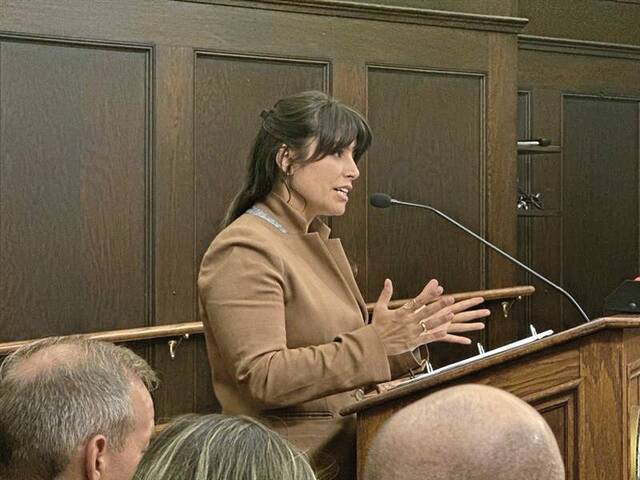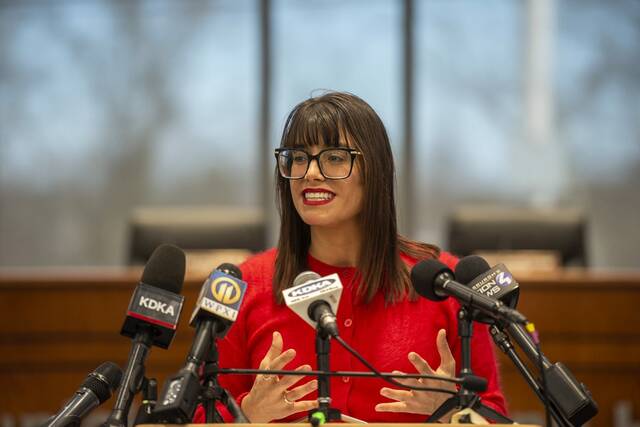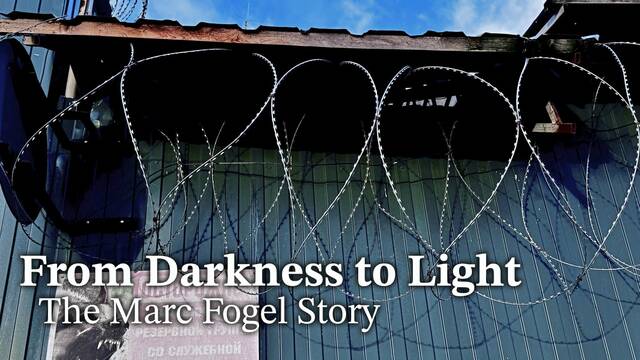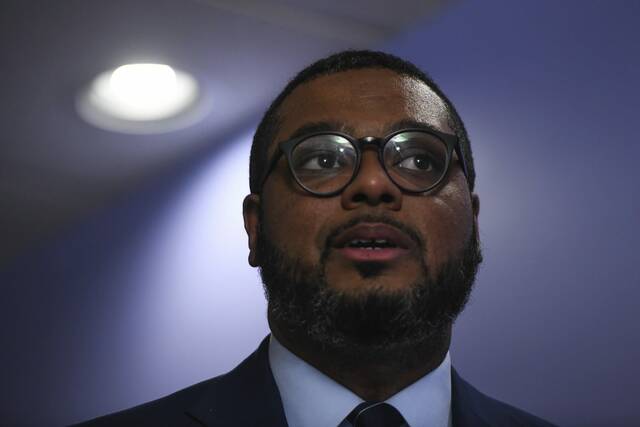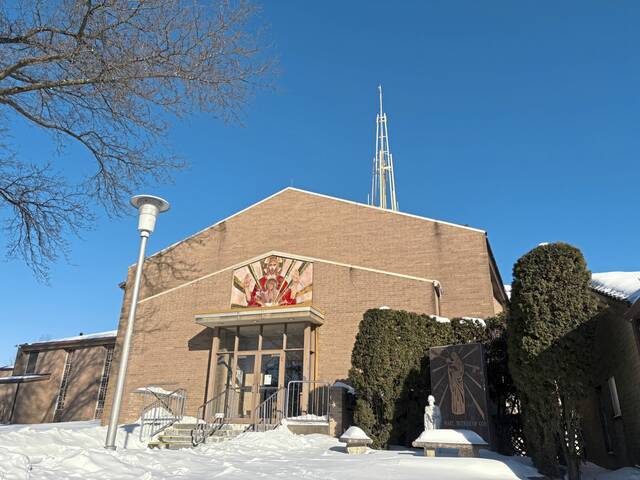Allegheny County Executive Sara Innamorato on Tuesday proposed a $3 billion 2026 budget with no tax increase or layoffs.
“The budget is tight, but we’re committed to living within our means,” County Manager John Fournier said, adding officials never seriously considered raising taxes for 2026.
Council will hold public hearings on the measure before taking a final vote before the end of the year.
County workers under Innamorato’s plan are budgeted to receive a 3% pay increase.
The budget includes a 1.52% increase in operating expenses, even as officials are working to drive down spending.
Officials said three factors are causing the increases in operating costs: inflation, tariffs and increases in the jail population, which adds about $10 million in expenses each year.
The county cut 35 vacant positions — as well as about 650 positions that were unfunded and existed only on paper — to save about $1.9 million without laying anyone off, Fournier said.
Positions that were cut span various departments, from court records to the health department.
The county employed a litany of other cost containment strategies to avoid tax hikes or draconian cuts, Fournier said.
The county expected such measures — like reducing the staffing ratios at Kane Community Living Centers, removing ineligible members from the county’s health care plan and centralizing information technology systems to avoid redundancies — to curb about $15 million in operating expenses next year.
The 2026 budget is balanced and does not, on paper, expect to put any more money into the county’s rainy day fund — though Fournier said officials have an internal goal of driving costs down to make some contribution to that fund.
The county’s fund balance is expected to be about $84 million at the end of the calendar year after seeing a $23 million contribution this year.
This comes after the county this year raised taxes for the first time in more than a decade.
“You can all exhale because we are not requesting a millage increase this year,” Innamorato joked during her address.
Council President Pat Catena, D-Carnegie, said he was relieved the council wasn’t asked to increase taxes again, especially after a contentious debate over hiking the millage last year.
“The taxpayers of Allegheny County should be happy at this point in time,” Catena said.
A 36% property tax increase in the 2025 budget addressed a potential $133 million shortfall this year. That tax hike marked a compromise after some County Council members balked at Innamorato’s initial pitch to raise taxes by over 46%.
Controller Corey O’Connor in his annual financial report this year said this year’s tax increase allowed the county to avoid immediate cuts, but he classified the county’s financial situation as “unsustainable.”
Despite tight margins, Innamorato’s budget also proposes new initiatives.
The budget will create a new Office of Worker Protections.
In August, Innamorato signed an executive order establishing the Office of Worker Protections, which tasked Fournier with looking at ways to expand rights for workers not currently covered by the National Labor Relations Act.
The order also promised to create the Best Value Procurement program, which requires bidders to demonstrate a commitment to worker safety to be awarded a contract for services with Allegheny County.
Also included is a new Department of Management and Budget, which will absorb the county’s budget director and budget analysts. Fournier said it would usher in a “completely different philosophy” about managing spending.
A new Safety Office — which Fournier dubbed “OSHA at the local (county) level” will include a new safety manager.
The new offices will largely be staffed by existing positions being moved under new umbrellas.
Innamorato also budgeted for increased investments in public safety — including new jobs in the public defender’s office and funding for cyber security improvements in the district attorney’s office — and for housing, roads and bridges.
Juvenile detention would be expanded
The capital budget includes funding to expand Shuman Juvenile Detention Center.
Adelphoi took over Highland Detention at Shuman in July 2024. During its first year of operation, Highland Detention served 269 youths with an average length of stay of about 15 days. The center’s operational capacity has 12 beds housed within one pod.
The county plans to expand Highland Detention to include five 12-bed pods, reaching a total capacity of 60 residents. The 2026-27 capital budget includes $18 million designated for construction of additional Shuman pods.
Over the past year, the cost of a bed has increased from $650.25 to $712.69 to $825.14, said Louis Takacs, spokesman for the county controller.
Innamorato’s budget plan calls for a $66 million bond issuance next year and an additional $78 million bond in 2027.
A problem: Decreasing property values
Fournier pointed to decreasing real estate values as a key reason for the county’s difficult financial position.
“One of the reasons our budget is so tight is because our real estate revenue is not growing like we need it to,” he said, pointing out the county’s tax valuation dropped by about 0.6% this year.
Tim Cox, the county’s budget director, said tax valuation will likely stay steady or decline slightly next year.
Real estate tax declines have been driven by decreasing commercial property values, particularly in Downtown Pittsburgh. When the covid-19 pandemic spurred a widespread shift to remote work, office buildings emptied and lost value.
That’s a challenge that has impacted municipalities throughout the country, Fournier said, adding he is hopeful the county is “more than halfway through” the period of declining real estate revenues.
The county already has used about 98% of the federal covid-19 relief money that helped buoy counties and municipalities through the pandemic.
Bright spot coming: NFL Draft
A bright spot in the county budget, officials said, is the NFL Draft, which will be hosted in Pittsburgh in April.
The county is using $3 million from its hotel tax revenue — which must be spent on tourism — to support the three-day event.
Revenues from drink, hotel and sales taxes related to the draft should bring in about $4.5 to $5 million to the county’s coffers, Cox estimated.
State, federal budget impasses
The county also faces financial pressures caused by Pennsylvania’s budget impasse and the federal government shutdown. Allegheny County each year receives about $375 million in federal funding and about $1 billion from the commonwealth.
“The president’s budget, which is being negotiated now in Congress, proposed cuts that would mean more than $100 million hit to our county’s budget annually,” Innamorato said. “It is unlikely that Congress will ultimately pass that budget that the president introduced. Anything that is reduced on top of these other reductions are going to impact individuals and entities across this county.”
Medicare and Medicaid reimbursements, Fournier said, are continuing to flow, despite the shutdowns.
Every quarter, the commonwealth goes without a budget, Cox said, that’s about $100 million not flowing to the county. That money funds everything from human services grants to operating costs for the medical examiner.
The county has paused nonessential hiring and discretionary spending as the state budget impasse wears on. Fournier said the county should be able to “muddle through” the state budget impasse without laying off workers or drastically scaling back operations.
“The longer this goes on, the worse it’s going to get,” he said, explaining hiring slowdowns could lead to longer wait times to access some county services.
The county might need to rein in spending even further if a budget is not passed by November or December, he said.
When given a chance to ask questions after Innamorato’s budget presentation, no council members immediately criticized the budget. Innamorato fielded brief questions about the state budget impasse and spending on Kane centers.
Officials acknowledged federal spending cuts could force the county to scale back some programs, though it’s hard to say what exactly those impacts could be until federal officials actually pass a spending plan.
President Donald Trump pitched a budget that would yank close to $120 million in federal money the county relies on, Cox said. That’s money that pays for community development grants, homeless support, immunization grants and substance-abuse programs.
If those cuts were to be approved — which remains unclear — the county would feel the pinch, Fournier said.
“We will do our best to manage, but losing that level of federal funding absolutely means programs will have to be closed,” he said.
Councilman Dan Grzybek, D-Bethel Park, said the county needs to budget responsibly to mitigate impacts of state and federal budget pauses or cuts.
But, he said, there’s only so much the county can do.
It would be “deeply unfair” to county residents to raise property taxes steeply enough to make up for potential federal funding cuts that could top $100 million, Grzybek said.
“These are programs that should be federally funded,” he said.


